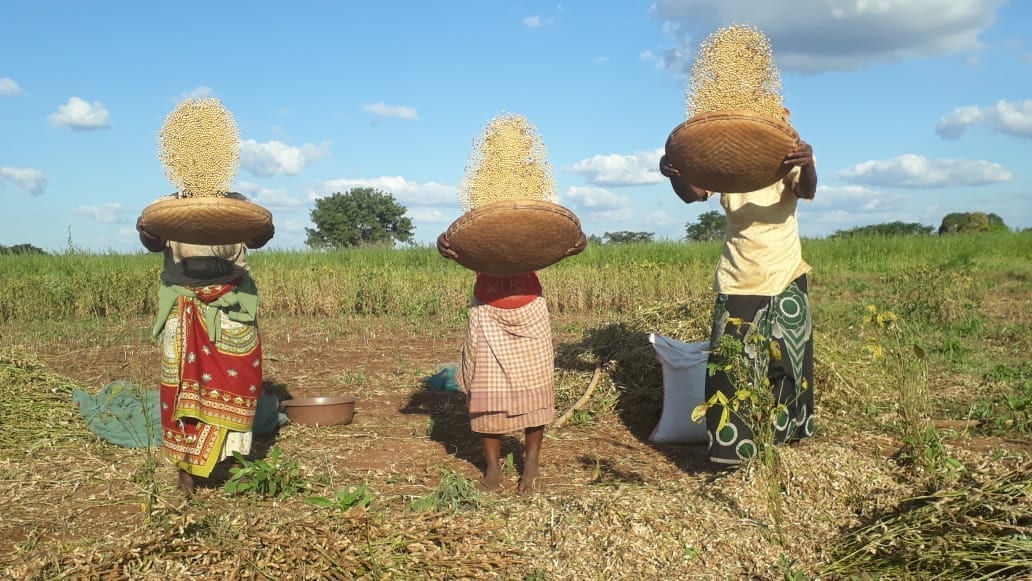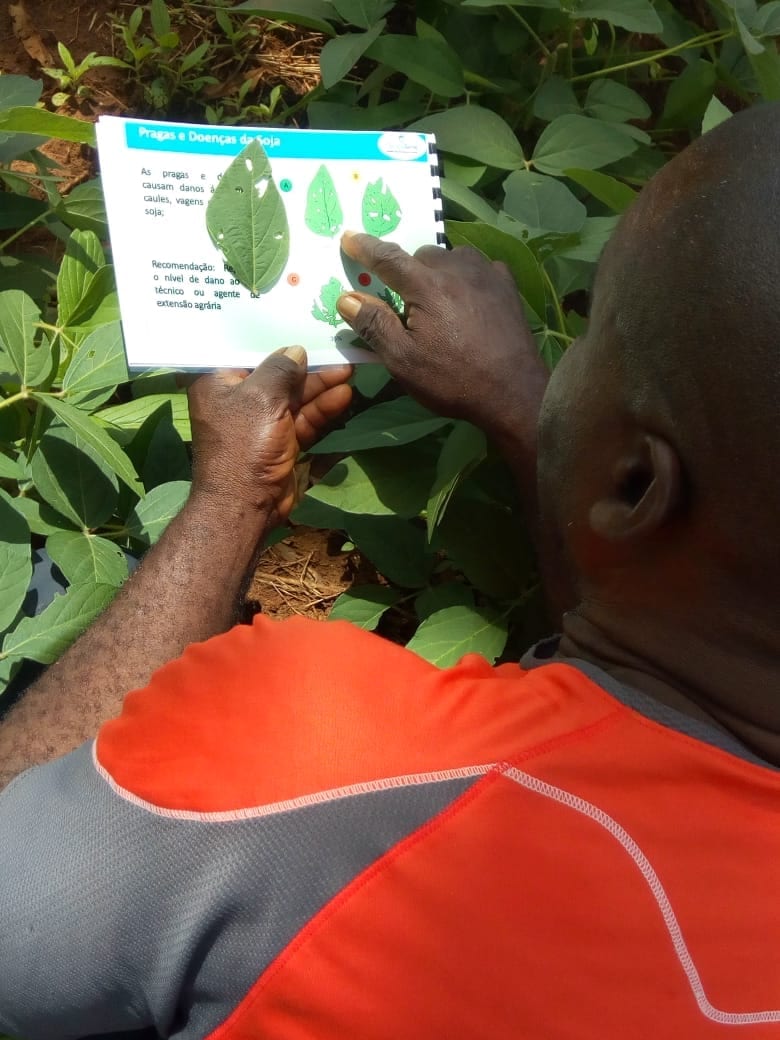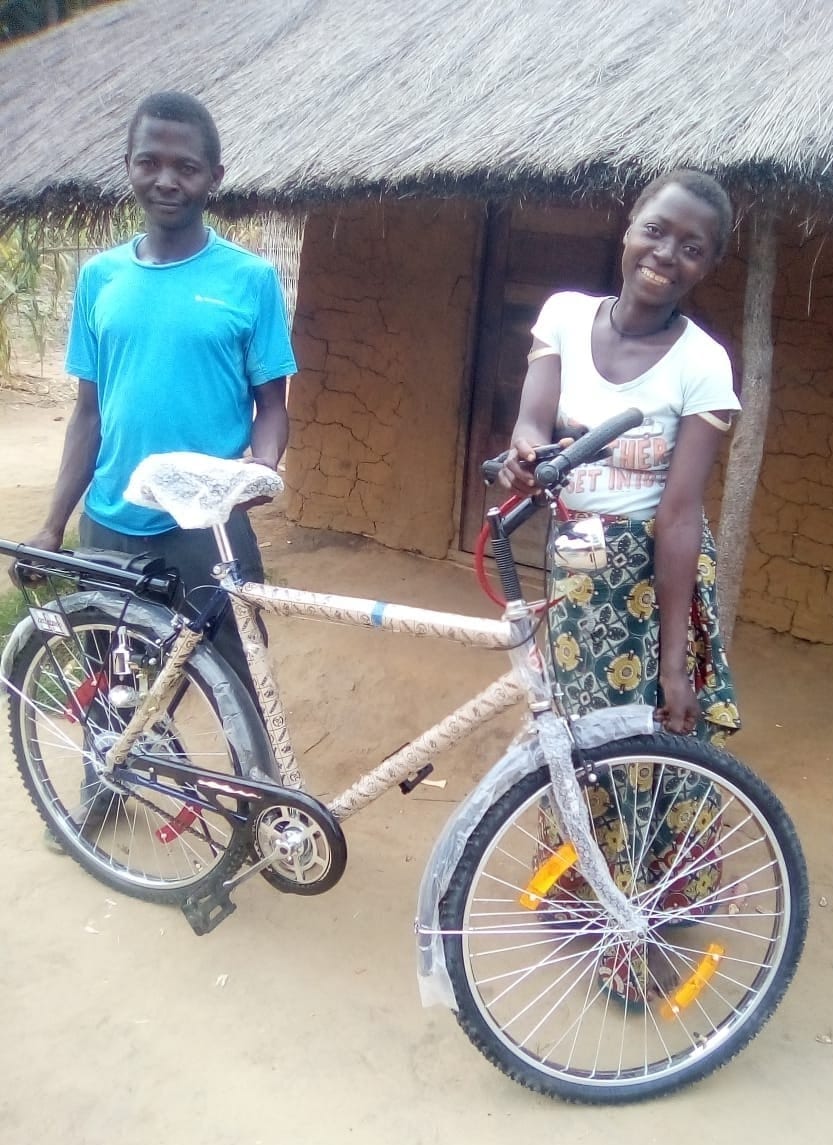In Cabo Delgado, Mozambique, Smallholder Farmers Overcome Adversity to Grow Their First Crop of Soybean
In a time of crisis, soybean is providing farmers in the Cabo Delgado province of northern Mozambique with income ahead of their normal cash crops. With funding from the Embassy of the Kingdom of the Netherlands, TechnoServe’s ProSoja program is helping smallholder farmers in this area profit from soybean production for the first time.

“I am very happy with the risk that we took in trying this new crop, soy,” Moisés Virgílio says. “We did not know what it was, how it was produced, [or] whether it would really be bought. But life is like that, and agriculture is a risky activity.”
Moisés Virgílio and his wife Arminda Feliz live with their two young children in the district of Namuno, Cabo Delgado, Mozambique. They are one of 300 smallholder farming families in Cabo Delgado province who have been harvesting their first-ever crop of soybean.
The family typically grows sesame and maize to feed and generate cash for the household. In November 2019, they were approached by TechnoServe field technicians, who spoke with them about the many advantages of soybean, including the fact that it has a proven domestic market and can help preserve soil fertility. They eventually decided to give the new crop a try and planted their first field in December 2019.
Today, they have already harvested over 661 pounds (300 kilograms) of the new crop and plan to do so again next year. “We will continue with soybeans and will increase it to at least one hectare next season,” Moisés says.
Introducing a New Crop
In late 2019, TechnoServe received funding from the Embassy of the Kingdom of the Netherlands, through a consortium led by SNV, to expand its work in soybean to the Cabo Delgado region through a new program called ProSoja (“soja” means soybean in Portuguese). The program’s main objective is to increase the incomes of smallholder farmers in Cabo Delgado through the production of soybean — a new cash crop with great potential in the province.
From October to December 2019, the ProSoja team worked to promote the new crop in Cabo Delgado by heading out to rural communities to help smallholder farmers like Moisés and Arminda understand the benefits of soybean, both from an income and soil fertility perspective. By adding another cash crop, particularly one that will help soil fertility, rural farming families will diversify the risk of relying on just one or two cash crops, thereby making them more resilient to price volatility and climate change. Soybeans can also be processed into nutritious milk and flour.
Smallholder farmers are extremely risk-averse and are not likely to adopt new crops or practices without full confidence that they will yield better results. In order to convince farmers in Cabo Delgado who have never grown soybean that they should start to grow this crop, the team had to show them how to cultivate soybean and why it could be profitable. To do this, they used demonstration plots: small plots of land used to demonstrate different agronomic techniques and crop production.
Early this year, TechnoServe established 15 demo plots across the region and began inviting farmers to learn on these plots. Following this, the team worked closely with the interested farmers, helping them to prepare their fields and plant their soybean.
A Shift for Survival
By mid-March, it became apparent that with the global outbreak of COVID-19 ready to hit Mozambique, the team would have to face yet another major challenge: shifting to working remotely within a matter of days. For a largely field-based team that spent most of their time working side-by-side with farmers in their fields, this was no small adaptation.
Farmers in this area often have limited literacy and little access to technology. Shifting their training to an online platform, such as Zoom or Skype, would not work. Most of the smallholder farmers had no smartphones, let alone enough wifi or data to join such a call. However, most farmers had feature phones on which they could be reached for simple one-on-one conversations.

“Knowing that our solution had to be something that could reach farmers who could not read well and had little access to the internet, we decided to go old school,” explains program manager Reginaldo Monjane. “The main thing we needed to teach farmers at that point was how to manage pests and diseases that could wipe out the entire fields they had just planted. This was our biggest concern in leaving them without our hands-on technical assistance during this first season.”
The team quickly pulled together images of all the main soybean pests and diseases and put them in a visual manual. Rather than using a lot of text to explain the various pests and diseases, they kept it simple. Each pest or disease is represented by a photo or drawing and is labeled with a number that the farmer could use to identify it. Upon seeing some pest or disease on their crop, a farmer could reach out to a ProSoja technician on the phone, who could walk them through the necessary treatment. While not a substitute for in-person assistance, it allowed the team to maintain support to the new soybean farmers during this essential stage before their harvest.
“This is a Dream Fulfilled”
Today, Cabo Delgado’s first batch of soybean farmers have been reaping the rewards of their leap of faith in soybean. These smallholder farmers are now harvesting their collective 300 hectares of soybean, which they are slowly beginning to sell.

“The money from soy we used to buy some things for the house: food and clothing,” Arminda says. “And we bought a bicycle to fulfill our dream.”
During times like these, where many people are facing deep financial uncertainty, the fact that soybean is harvested before other cash crops like sesame and cotton is extremely helpful. These farmers will have essential cash in hand much earlier than they normally would. Even in a normal year, harvesting a new crop for the first time would be considered a success; but this year, in light of the coronavirus pandemic and growing economic crisis, it is even more significant.
“Why a bike?” Arminda asks, smiling. “I remember the first day ProSoja’s technicians met us for the first time. They asked, ‘What would you like to buy with the production of the farm?’ We answered ‘A bicycle to facilitate getting to our farm and carrying our produce (our farm is over 3 miles from our house).’ This is a dream fulfilled.”




